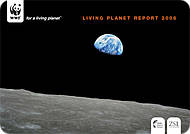Human demands on the world’s resources have reached nearly a third more than planet can sustain, according to the latest edition of WWF’s Living Planet Report.
The report, released this week, suggests that the world is heading for an ecological credit crunch. In addition, the report found that global natural wealth and diversity continues to decline, and more and more countries are slipping into a state of permanent or seasonal water stress.
Canadians were found to have the seventh-largest ecological footprint. Roughly half of Canada’s ecological footprint comes from carbon released from transportation, heating and electricity production, which contribute to climate change.
Highlights from the Report
- Canada has the 12th largest water footprint-the average Canadian consumes more than 2,000,000 litres of water per year. That’s the equivalent of 5,400 litres of water per person per day, or the equivalent of running a kitchen tap for over 10 hours a day every day, or flushing the toilet nearly 1,000 times each day.
- While Canada has large volumes of available freshwater on a per capita basis, the challenge is that the vast majority of this water is not easily accessible to most Canadians. In other words, our water is distributed throughout the northern parts of our country while our population is in a thin band along the US-Canada border. Accordingly, there are regional water shortages, for both humans and species.









